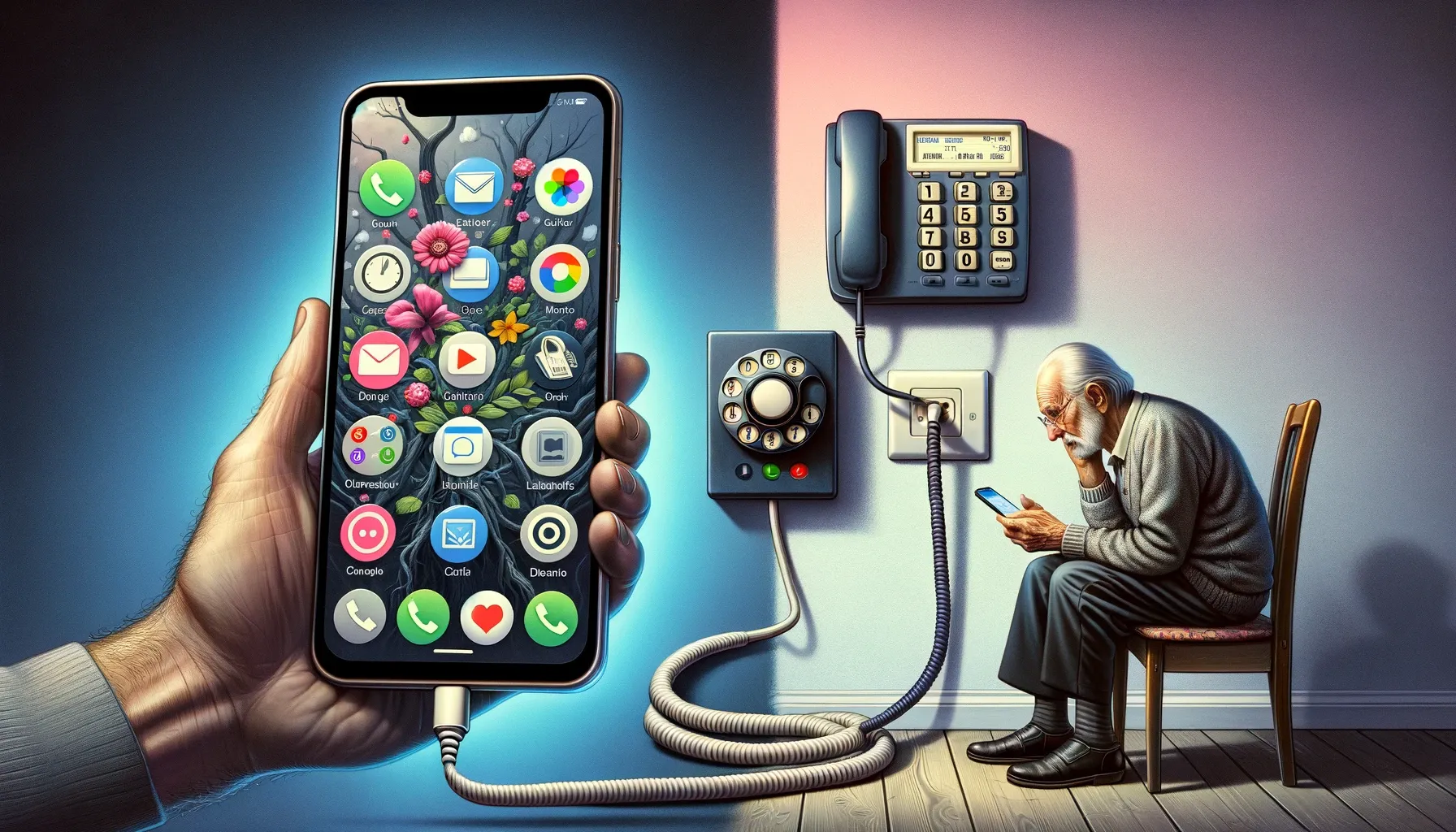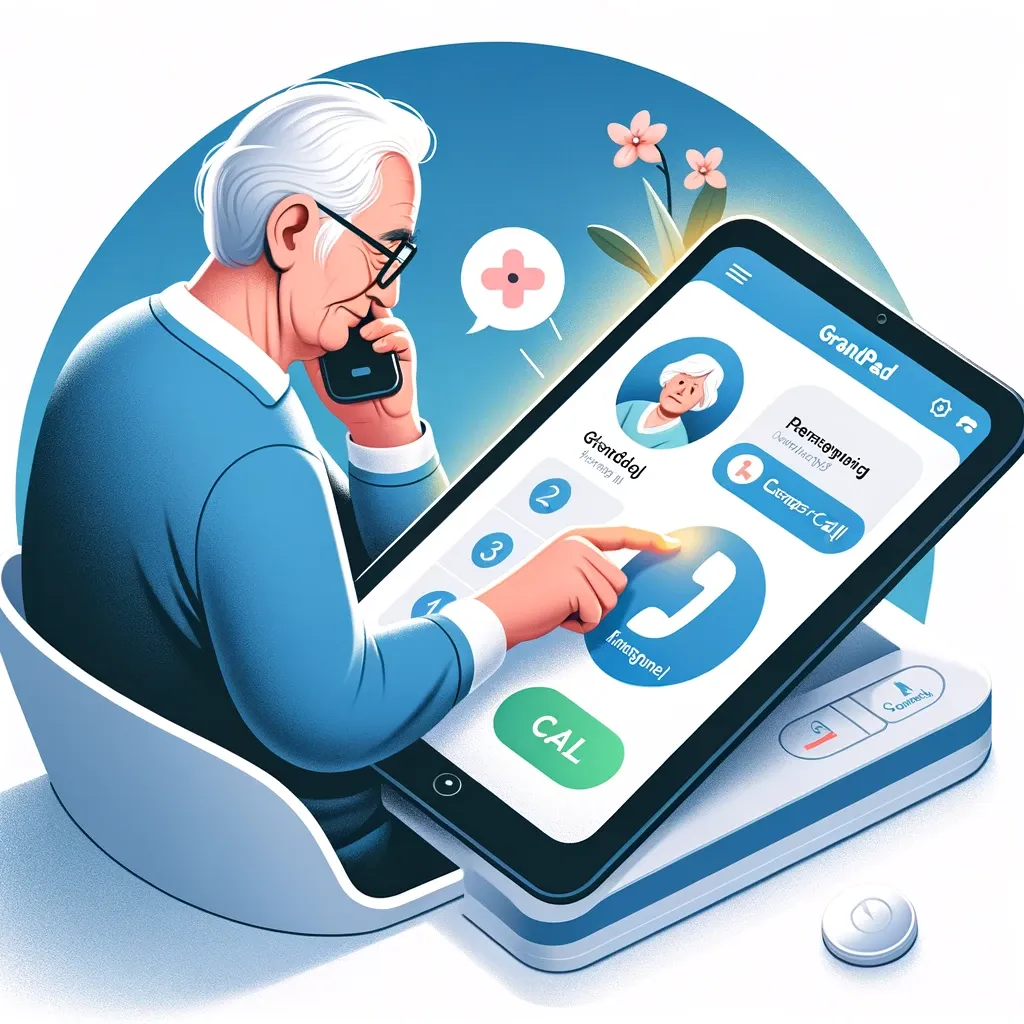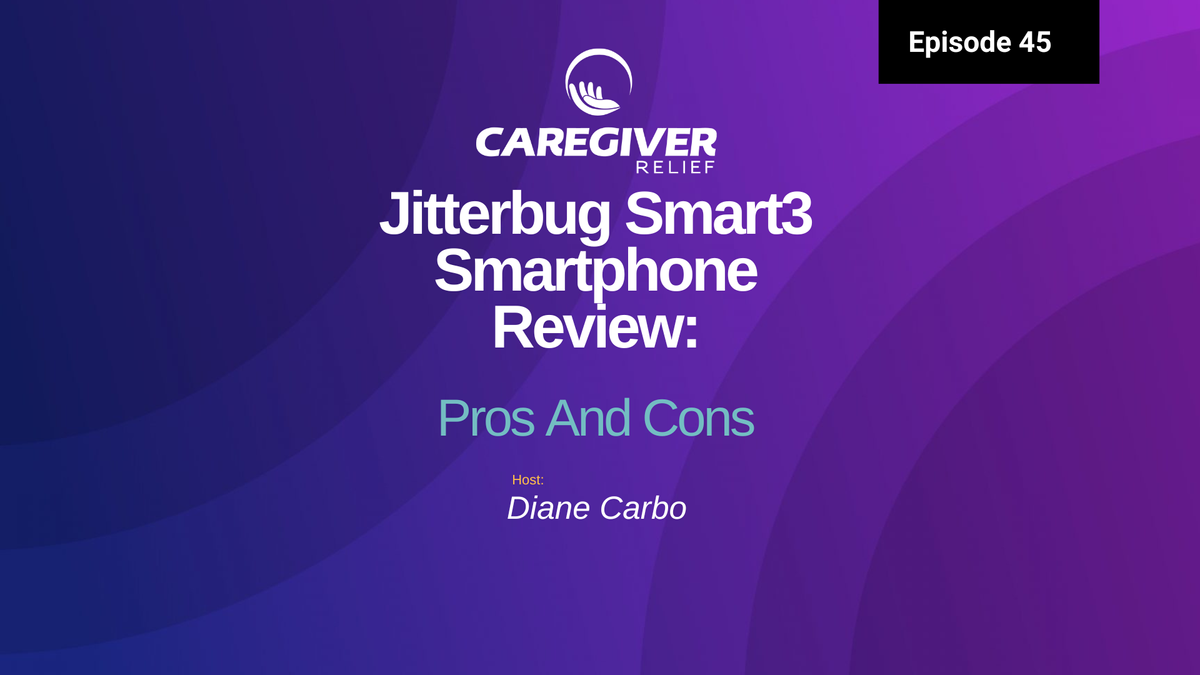Constant Phone Calls: Dementia Confusion with the Telephone and Tips for Caregivers
As dementia progresses, it can become more difficult for your loved one to use the telephone. Learn how to monitor phone usage, block unwanted calls, and establish boundaries to reduce confusion and protect your loved one from scams and fraud.

What are the best phones for Alzheimer's patients?
As our loved ones age, it’s important to ensure their safety and well-being. For those living with dementia, this can be a particularly challenging task – especially when it comes to using telephones. The confusion and memory loss associated with dementia can make it difficult for them to use a phone correctly, and can even lead to accidental emergency calls, creating unnecessary strain on emergency services when there is no real emergency. In this post, we’ll discuss the best cell phones for seniors with dementia, as well as some helpful features and tips to keep your loved one safe and connected.
The telephone can become a source of confusion for individuals with dementia as the disease progresses. While using the phone is typically unproblematic in the early stages, various challenges may arise over time, especially if your family member still has access to a phone.
Understanding the Issue
Dealing with frequent phone calls from a loved one with dementia can be a challenging and emotional experience for family members and caregivers. It’s essential to understand the underlying reasons behind this behavior to develop effective strategies for managing these calls. People with dementia may call repeatedly due to memory loss, separation anxiety, loneliness, or boredom. They may also experience difficulty articulating their needs or feelings, leading to frustration and anxiety. By recognizing the root causes of these phone calls, caregivers can take steps to address the underlying issues and provide support and comfort to their loved ones.
The telephone can become a source of confusion for individuals with dementia as the disease progresses. While using the phone is typically unproblematic in the early stages, various challenges may arise over time, especially if your family member still has access to a phone.
Common Challenges
Caregivers of loved ones with dementia often face common challenges when dealing with frequent phone calls. One of the most significant challenges is managing the emotional toll of these calls. Caregivers may feel anxious, frustrated, or guilty about not being able to respond to every call. They may also struggle to balance their own needs and responsibilities with the demands of caregiving. Additionally, caregivers may face challenges in communicating with their loved ones, particularly if they are experiencing memory loss or difficulty articulating their thoughts. By acknowledging these challenges, caregivers can seek support and develop strategies to manage their own mental health and well-being.
The Importance of Choosing the Right Phone
As dementia progresses, it’s important to find a phone that is easy for your loved one to use and understand. This can help reduce frustration and confusion, and allow them to continue communicating with their friends and family. In addition, having access to a phone at all times – especially when living alone – can provide peace of mind for both the individual and their caregivers.
Be Cautious of Dementia-Related Confusion
Don’t assume that your family member will always know how to use a phone correctly. While they might retain this skill for a while, there will be days when confusion sets in, causing anxiety. During these moments, offering more direct assistance with Activities of Daily Living (ADLs), including using the telephone, may be necessary.
Check the Phone Bill for Red Flags
Monitoring your family member’s phone usage can reveal early signs of problems. Keep an eye out for:
- Unusual long-distance calls.
- Calls they don’t remember making, at any time of day or night.
- Accepting collect calls from unfamiliar sources or estranged family members.
- Making impulse purchases from TV ads.
- Donating to organizations they’ve seen on TV.
- Falling victim to scams.
Video calls may decrease confusion
Block Unwanted Calls
To reduce dementia-related confusion, consider blocking calls from unfamiliar or unwanted numbers. This can prevent your family member from making accidental calls and only allow incoming calls from known contacts.
Hearing Aid Compatibility
Ensure that your loved one’s phone is compatible with their hearing aid, as this can improve the quality of conversations and reduce misunderstandings.
Choose Landlines Over Cordless Phones
For dementia patients, ordinary landline service might be preferable to cordless phones. Landlines are easier to control and less prone to getting lost or damaged, making them a more reliable option.
Protect Against Telemarketers
Seniors with dementia are often targeted by telemarketers and sales representatives. Contact your phone company to have telemarketing calls blocked. You can also register with the National Do Not Call Registry.
Avoid dementia confusion. Make the telephone available at certain times of the day
The Importance of Choosing the Right Phone
As dementia progresses, it's important to find a phone that is easy for your loved one to use and understand. This can help reduce frustration and confusion, and allow them to continue communicating with their friends and family. In addition, having access to a phone at all times – especially when living alone – can provide peace of mind for both the individual and their caregivers.
Be Cautious of Dementia-Related Confusion
Don't assume that your family member will always know how to use a phone correctly. While they might retain this skill for a while, there will be days when confusion sets in. During these moments, offering more direct assistance with Activities of Daily Living (ADLs), including using the telephone, may be necessary.
Check the Phone Bill for Red Flags
Monitoring your family member's phone usage can reveal early signs of problems. Keep an eye out for:
- Unusual long-distance calls.
- Calls they don't remember making, at any time of day or night.
- Accepting collect calls from unfamiliar sources or estranged family members.
- Making impulse purchases from TV ads.
- Donating to organizations they've seen on TV.
- Falling victim to scams.
Video calls may decrease confusion
Block Unwanted Calls
To reduce dementia-related confusion, consider blocking calls from unfamiliar or unwanted numbers. This can prevent your family member from making accidental calls and only allow incoming calls from known contacts.
Hearing Aid Compatibility
Ensure that your loved one's phone is compatible with their hearing aid, as this can improve the quality of conversations and reduce misunderstandings.
Choose Landlines Over Cordless Phones
For dementia patients, ordinary landline service might be preferable to cordless phones. Landlines are easier to control and less prone to getting lost or damaged, making them a more reliable option.
Protect Against Telemarketers
Seniors with dementia are often targeted by telemarketers and sales representatives. Contact your phone company to have telemarketing calls blocked. You can also register with the National Do Not Call Registry.
Avoid dementia confusion. Make the telephone available at certain times of the day
Do you have a person with dementia calling constantly?
What are the best phones for seniors with dementia?
Dementia-related confusion can make using the telephone a challenging task. Implementing these strategies can make the experience safer and more manageable for both your family member and you as a caregiver.
Choosing the Right Phones for Seniors with Dementia or the Best Alzheimer’s Phone Service
Some families consider removing the landline when caring for a senior with dementia. In today’s world of cell phones, this option eliminates access to a phone, reducing the risk of misuse or harassment. Additionally, establishing quiet hours can help manage phone calls during specific times, ensuring undisturbed rest and personal time for both caregivers and their loved ones.
Exploring the No-Landline Option
As cell phones become more prevalent, some families opt to eliminate landlines altogether for dementia patients. This choice can prevent the person with dementia from misusing the phone or causing distress to others. With a cell phone you can limit incoming and outgoing calls
Understanding the Role of Phones in Dementia Care
It’s crucial to recognize why seniors with dementia may use phones more frequently. They might do so to alleviate confusion or anxiety. Specifically designed phones for dementia patients address these issues.
Managing Incoming Calls
Consider having someone answer the landline phone on behalf of your family member with dementia. Alternatively, set up call forwarding or voicemail to ensure friends and family can reach out when needed. For mobile phones, block incoming calls to known numbers to reduce confusion.
Mobile Phones vs. Landlines
While mobile phones are widely used, some dementia patients find them confusing. Stick to landlines if your family member struggles with mobile phone features, like answering calls or voicemail. If you have an elderly mother that calls constantly, you can limit incoming and outgoing calls by removing the connection in the wall at times.

Maintaining Communication and Understanding
Dealing with dementia-related phone confusion can be challenging. Exercise patience, love, and grace for both yourself and your loved one during these times. Effective communication is essential, whether you opt for landlines or mobile phones.
If you have not created a Person Centered Profile for your family member or friend ,it’s time to do so now.
Specialized Phones for Dementia Patients
Explore phones designed for dementia patients, like the Roz Memory Cell Phone. These phones come preloaded with contacts and offer simplified calling, promoting both convenience and peace of mind.
Consider Picture Phones

Best Cell Phone For Alzheimer Patients
Picture phones, which display images instead of numbers, make it easier for those with dementia to make calls. They feature large icons that are more easily recognizable to individuals with memory issues.
Emergency-Ready Phones
Some phones designed for dementia patients have pre-programmed emergency contacts for added safety. These devices can be invaluable in critical situations.
Keep the Phone Accessible
Ensure your family member always has access to their phone, especially when they’re away from home or living alone. This ensures they can stay connected even if they forget how to use it.
Set Up Emergency Contacts
Establish specific emergency numbers for your loved one to call, such as a family member or caregiver. This ensures they have immediate support when needed.
By selecting the right phone, setting up emergency contacts, and ensuring access to the device, you can reduce confusion and stress associated with dementia and telephones. These measures provide your family member with the best chance to stay safe and connected throughout their journey with dementia.

Voice calls can be confusing for a person with dementia
Understanding Dementia Confusion and the Role of Phones
Dementia Confusion Triggers:
Dementia confusion can be amplified by various factors:
Sundowning and Unexpected Noises: Dementia patients may experience heightened confusion during sundowning, a late-day agitation period. Unexpected loud noises, like a ringing phone, can exacerbate this confusion, leading to negative behaviors or catastrophic reactions.
FAQ: Is Providing a Fake Phone for Dementia Patients Okay?
Introducing a fake phone for dementia patients may not be advisable for several reasons:
- Reality vs. Illusion: Dementia patients often struggle to distinguish reality from imagination. A fake phone blurs this line further, increasing their overall confusion.
- Frustration: Inability to use a non-functional phone may lead to frustration and heightened confusion.
- Agitation: Some dementia patients might become distressed when unable to understand the purpose or functionality of a fake phone, worsening their confusion.
- Inconsistent Information: Fake phones provide inconsistent information, compounding overall confusion.
- Loss of Trust: Introducing a fake phone without transparency can erode trust, intensifying insecurity and confusion.
- Unpredictable Reactions: Dementia affects individuals differently; reactions to fake phones can vary, potentially increasing anxiety or withdrawal.
Considering individual needs and consulting dementia care professionals is crucial before using fake phones. Alternative approaches like validation therapy, sensory engagement, and reminiscence therapy should also be explored to manage confusion effectively.
Assisting Seniors with Dementia and iPhones:
Balancing smartphone use for seniors with dementia presents challenges:
- Constant Misplacement: Memory issues lead to frequent phone loss.
- Hearing Impairment: Hearing problems or low volume settings can make ringing unheard.
- Loss of Interest: Some lose interest in technology, especially if they weren’t tech-savvy before.
- Continued Engagement: Smartphones remain essential for routines, staying connected, and accessing information.
Caregivers should invite their elderly loved ones to discuss their feelings and motivations for calling, emphasizing the importance of understanding their needs by asking them the same questions the caregiver might ask themselves.
Navigating Dementia Challenges with iPhones: 4 Tips:
- Simplify: Decline in cognitive skills benefits from simplified interfaces.
- Prioritize Familiarity: Stick with familiar phone models to minimize confusion.
- Avoid Complex Teaching: Dementia impairs learning new tasks; focus on familiar actions.
- Ensure Online Safety: Protect against scams by safeguarding online access.
How to Activate a Raz Memory Phone in a Memory Care Facility:
Activating a Raz memory phone is straightforward:
- Purchase and Register: Buy the phone, register it online with your contact information.
- Connect to Power and Internet: Plug in the power adapter, connect to your home router or mobile network.
- Customize Settings: Set up reminders, program contacts, adjust call volume, and configure additional features to suit your loved one’s needs. Place the phone on a bedside table to ensure it is in a familiar location.
Raz Memory Phone Support:
Remember that Raz memory phones offer 24/7 customer support for any assistance needed, ensuring your elderly loved one stays connected and supported.
Raz Emergency Service
In conclusion, understanding dementia confusion triggers, making informed choices about fake phones, assisting seniors with smartphones, and activating Raz memory phones can all contribute to improved care and support for those living with dementia. Caregivers should prioritize simplified experiences, embrace familiarity, avoid complex teaching, ensure online safety, and explore various approaches to manage confusion effectively.
Does Mint Mobile have a Phone for People with Dementia?
Mint mobile for dementia patients is also a great choice because it simplifies the process of making phone calls while giving caregivers the ability to monitor their loved one's activity. By providing an easy-to-use interface, Mint mobile makes it simple for those with memory loss or confusion to place and receive calls. Additionally, the app has a built-in emergency feature that can dial 911 directly in case of an emergency. Caregivers are also able to activate and deactivate the phone remotely, making it possible for them to manage usage even when they're not around.
Tell me about GrandPad

Grand pad for dementia was designed to make calls with seniors with cognitive issues
Another option is GrandPad, which provides a secure way for seniors with dementia-related confusion to make and receive calls. With this device, users can easily contact family members without requiring a complex setup. It eliminates the need for them to remember phone numbers, as they can easily access contacts from their personal contact list. GrandPad also includes an emergency call button that can be used in case of an emergency.
Overall, these are some of the best phones available for those with dementia-related confusion and memory loss, ensuring that they have access to the help they need when needed. With these devices, caregivers can feel confident that their loved ones are safe and secure.
There are also a variety of other options available for those with dementia-related confusion. Caregivers should take the time to explore all of their options and decide which phone is best suited for their needs. This will ensure that their loved one has the tools necessary to stay connected with family and friends, while also having access to emergency services when needed
What are the Best Cell Phones for Seniors with Dementia?
When it comes to choosing a cell phone for someone with dementia, there are a few key features to keep in mind. The best cell phones for seniors with dementia should have large icons and easy-to-read screens, as well as simple navigation and calling functions. Additionally, picture phones – which display pictures instead of numbers – can be particularly helpful for those with memory problems. Caregivers in a memory care facility often face ongoing struggles, including communication issues and the need for effective routines to manage anxiety and help dementia patients feel secure.
There are also specialty cell phones designed specifically for dementia patients. These phones often come with pre-programmed emergency contacts and simplified calling features, making it easier for your loved one to reach out for help if needed.
Safety Features to Consider
In addition to choosing the right phone, there are also safety features that can be beneficial for someone with dementia. For example, many cell phones have a feature that allows you to block outgoing calls. This can prevent your loved one from accidentally making calls to unknown numbers, and will only allow them to receive incoming calls from known contacts.
It’s also important to make sure that the phone is hearing aid compatible if your loved one wears a hearing aid. This will ensure clear communication without any confusion due to poor sound quality or muffled audio. Additionally, considering these safety features is crucial for those living in their own home, as it can significantly impact their emotional well-being and sense of security.
Setting Up Emergency Contacts
No matter which phone you choose, it’s important to set up emergency contacts for your loved one, including other family members. This can include family members, caregivers, or other trusted individuals who can provide assistance in case of an emergency. By having specific numbers programmed into the phone, your loved one will have someone to call in times of need.
Alzheimers Phone Service: A Helpful Resource
In addition to choosing the right cell phone, there are also services available specifically for Alzheimer's patients. These services can include monitoring devices, emergency response systems, and even specially designed phones with simplified features for those with memory problems. It's worth looking into these resources to see if they may be beneficial for your loved one.
Conclusion: Keeping Your Loved One Safe and Connected
By choosing the right phone, setting up emergency contacts, and considering additional safety features, you can help reduce confusion and stress associated with dementia and telephones. It's important to regularly check in with your loved one to ensure their phone is functioning properly and that they have access to it at all times. Remember, communication is key, so providing them with a reliable and easy-to-use phone can make all the difference. With the right tools and support, your loved one can stay connected and safe, even in the face of dementia. Stay informed and never hesitate to reach out for help from a healthcare professional if needed.
Frequently Asked Questions: Managing Dementia-Related Confusion with Telephones
Why does a dementia patient keep calling me all the time? It's common for dementia sufferers to make repetitive phone calls. This behavior can be attributed to confusion, forgetfulness, or the need for reassurance. They might not remember that they've already called, or they might feel anxious and reach out repeatedly for comfort.
Are there special phones designed for dementia sufferers? Yes, there are phones specifically designed for dementia patients. These phones typically have features such as photo speed dial, fewer buttons, and louder ring tones to aid those with cognitive impairments. This helps reduce confusion and makes it easier for sufferers to communicate with their loved ones and caregivers.
How can I handle repetitive phone calls from my aging parent with dementia? It's important to remain patient and understanding. Gently remind them that they have just called and assure them that everything is okay. Setting a routine for regular calls might also help manage their need to reach out frequently.
What should I do when the phone rings constantly due to a dementia patient calling repeatedly? First, ensure the safety of the dementia patient by confirming there isn't an emergency. You can consider redirecting their attention during calls or setting up specific times for them to call. Additionally, technology like call scheduling or automated reminders might help alleviate constant ringing.
How can I ensure the message gets through when speaking to someone with dementia over the phone? When speaking to someone with dementia, use simple, clear language and speak calmly. Repeat the same message if necessary, to help them understand. Reassurance can also play a vital role in making them feel heard and comforted.
What mental health support is available for caregivers of aging parents with dementia? Caring for someone with dementia can be challenging. Mental health support for caregivers can include counseling, support groups, and respite care services. These resources can provide emotional support and practical strategies for managing day-to-day challenges.
How can technology assist in managing dementia-related confusion with telephones? Technology like simplified smartphones, apps designed for memory aids, and GPS trackers can significantly aid in managing dementia-related issues. Programs that block unknown callers can also prevent confusion and ensure that patients only receive calls from familiar numbers.
💡
Have more questions? Check out the Frequently Asked Question section of the website. You will find a lot of different questions answered directly.
💡
Do you need help caring for a loved one?
Our Resource section can help you find the information and tools that you need. We have courses, videos, checklists, guidebooks, cheat sheets, how-to guides and more.
You can get started by clicking on the link below. We know that taking care of a loved one is hard work, but with our help you can get the support that you need.
Click here to go to Resource Section now!
Here are some other tips that you may find useful when providing ADL's :
- Eating
- Ambulation
- Bathing
- Dressing
- Cooking
- Shopping
- Housework
- Laundry
- Understanding Dementia Catastrophic Reaction
- Pro's and cons of Jitterbug Smart 3 Smartphone
Have a story about your caregiving journey? Would like to share here? Help others realize that they are not alone. Submit Your Caregiver Story
Our Resource section can help you find the information and tools that you need. We have courses, videos, checklists, guidebooks, cheat sheets, how-to guides and more.
You can get started by clicking on the link below. We know that taking care of a loved one is hard work, but with our help you can get the support that you need.
Click here to go to Resource Section now!
Here are some other tips that you may find useful when providing ADL’s :
- Eating
- Ambulation
- Bathing
- Dressing
- Cooking
- Shopping
- Housework
- Laundry
- Understanding Dementia Catastrophic Reaction
- Pro's and cons of Jitterbug Smart 3 Smartphone
You might also like this article:




















